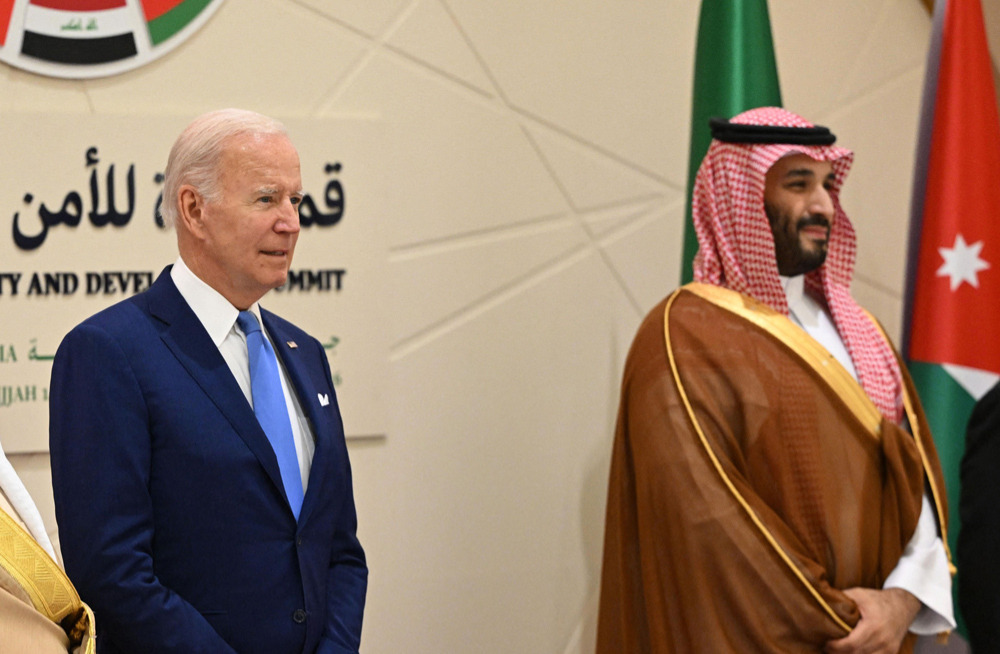Arabs: Biden Emboldening Iran, Harming US Interests
by Khaled Abu Toameh • October 18, 2022 at 5:00 am
"[T]his relationship [between the US and Saudi Arabia] should be based on reciprocity. If Washington is looking for its own interests, as with the Iran nuclear deal or the cancellation of the [Iranian-backed] Houthi group's designation as a terrorist group, Saudi Arabia also has the right to seek its own interests...." — Rami Al-Khalifa, Syrian author, Elaph, October 12, 2022.
"Biden was the one who decided to pursue a hostile policy towards the [Arab] allies. He and his team were the ones who gave in to America's enemies and went looking for nuclear agreements that are fraught with flaws and harm to many of America's friends." — Abdul Jalil Al-Saeid, Syrian author, Al-Ain, October 11, 2022.
The Arab League, for its part, condemned the Biden administration for waging a "negative campaign" against Saudi Arabia.
These reactions from the Arab countries indicate that the Arabs no longer see the US as a strategic ally or even as a friend. This is excellent news for the mullahs in Iran and their terrorist proxies in the Middle East, including Hezbollah, Hamas, Palestinian Islamic Jihad and the Houthis in Yemen.
"In retrospect, I think that was a mistake," Obama said, referring his total failure to help the Iranian protestors in 2009, when he sided with the regime.... He ended by noting that it was important "to affirm what they do and I hope that it brings about more space for the kind of civic conversation that over time can take the country down a better path."
"Civic conversation"? With Iran's savage regime? That's it?
White House spokesman John Kirby gave the game away. "The president ," he said, "still believes that a diplomatic way forward is the best way forward...."
It is not a secret, however, that a diplomatic way without a credible military threat to back it up is useless. Even soft-power advocate Joseph Nye, former Dean of the Harvard's Kennedy School of Government, had to concede that, "to be realistic, soft power is never going to replace hard power."
The Biden administration appears to be waiting until after the November mid-term elections, when Congress will be in recess for its Christmas holiday and therefore unable to block the deal.
So far, 50 "deeply concerned" members of Congress, mostly Democrats from Biden's own party, have sent Biden a letter effectively opposing the deal.
The Saudis and their allies in the Gulf appear to be wondering why Biden is threatening them with "consequences" simply for trying to protect themselves from soon being annihilated by Iran, especially as it was the US that introduced the mortal threat against the Saudis -- by granting Iran nuclear weapons with the 2015 JCPOA nuclear deal -- in the first place.
In [2015]... Obama revealingly let slip: "Even before taking office, I made clear that Iran would not be allowed to acquire a nuclear weapon on my watch..." [Emphasis added.]
The new Iran deal, according to reports, also does not prevent Iran from having nuclear weapons capability, and would merely postpone the same disaster until after the Biden administration's "watch."
"[H]ow can we in good conscience," Obama said in his July 2015 statement, "justify war before we've tested a diplomatic agreement that achieves our objectives; that has been agreed to by Iran."
This diplomatic agreement has now been tested. It failed. That is why this or any agreement with Iran should be allowed to die a dignified death, especially during Congress's Christmas recess.

The Saudis and other Arabs who were once considered America's major allies in the Middle East have resumed their criticism of the Biden administration, accusing it of harming US interests and alienating Washington's friends.
The criticism came after US President Joe Biden threatened that "there will be consequences" for US relations with Saudi Arabia after OPEC+ announced that it would cut its oil production target. It also came after White House press secretary Karine Jean-Pierre said a policy review of US-Saudi relations would be conducted in response to the OOEC+ announcement.
The Saudis did not take the statements emanating from Washington lightly.
Responding to the statements, Saudi Arabia affirmed its "rejection of any dictates, actions or efforts to distort its noble objectives to protect the global economy from oil market volatility."

